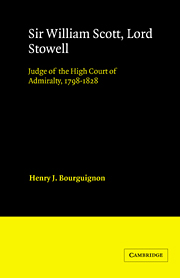Book contents
- Frontmatter
- Contents
- Preface
- List of abbreviations
- 1 Survey of English admiralty jurisdiction: how did it vanish?
- 2 Sir William Scott – a biographical sketch
- 3 The law of the instance court
- 4 Prize law: nationality – a study in detail
- 5 Prize law – a survey
- 6 Scott's judicial philosophy
- 7 Scott's influence
- Appendix: the Stowell notebooks
- Bibliography of primary sources
- Index
- CAMBRIDGE STUDIES IN ENGLISH LEGAL HISTORY
4 - Prize law: nationality – a study in detail
Published online by Cambridge University Press: 29 October 2009
- Frontmatter
- Contents
- Preface
- List of abbreviations
- 1 Survey of English admiralty jurisdiction: how did it vanish?
- 2 Sir William Scott – a biographical sketch
- 3 The law of the instance court
- 4 Prize law: nationality – a study in detail
- 5 Prize law – a survey
- 6 Scott's judicial philosophy
- 7 Scott's influence
- Appendix: the Stowell notebooks
- Bibliography of primary sources
- Index
- CAMBRIDGE STUDIES IN ENGLISH LEGAL HISTORY
Summary
There can be no doubt that Sir William Scott, Lord Stowell, retains a small place in history primarily because of his application, interpretation and development of prize law. His instance judgments, significant for adding precision where there had been vague principles, are numbered in the dozens, whereas his prize judgments, far more significant as early pronouncements on the international law of war, are numbered in the hundreds. The wars which involved and nearly engulfed Great Britain for most of the years Scott sat as judge gave him a unique opportunity to achieve lasting fame as judge of the admiralty court.
Scott's profound grasp of the economic and social realities of the shipping industry, as we have seen, on occasion provided him with policy reasons for his instance judgments. His far more numerous prize judgments show his deep understanding of the much more complex realities of military strategy, shifting government policy and conflicting economic and social forces.
Scott was, after all, a thoroughly eighteenth-century man. He understood, though he did not always sympathize with, the political, economic and social developments going on around him. This historical matrix, so familiar to Scott, served as a basis for policy arguments, sometimes unspoken, in many of the significant cases he heard. A brief suggestion of some dimensions of the historical context of Scott's prize judgments, therefore, will make possible a better appreciation of his contribution.
BACKGROUND
One obvious policy consideration behind maritime warfare during the French wars and Napoleonic wars was military. Great Britain was at war with France and its allies from 1793 to 1802 and from 1803 till the final defeat of Bonaparte in 1815.
- Type
- Chapter
- Information
- Sir William Scott, Lord StowellJudge of the High Court of Admiralty, 1798–1828, pp. 115 - 171Publisher: Cambridge University PressPrint publication year: 1987
- 1
- Cited by



